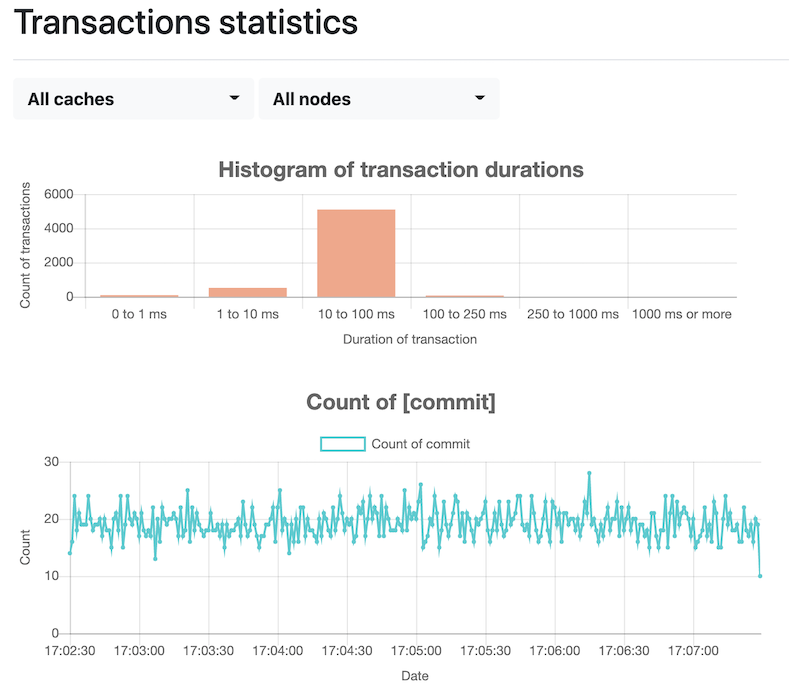As of March 15, 2021, Apache Ignite 2.10 has been released. You can directly check the full list of resolved Important JIRA's but here let’s briefly overview some valuable improvements.
Thin Clients
Thin clients now support several important features which, previously were available only on the thick clients. Thin clients are always backward and forward compatible with the server nodes of the cluster, so the cluster upgrade process will be more convenient if the lack of these features prevented you from doing that.See the list of what is changed for thin clients below:
- Transactions
- Service invocations
- Continuous Queries
- SQL API
- Cluster API
- Cache Async API
- Kubernetes Discovery (ThinClientKubernetesAddressFinder)
Cluster Monitoring
Apache Ignite self-monitoring and cluster health check subsystems are also extended by additional SQL-views and command line scripts.New control-script Commands
Query any of the available system views.
control.sh --system-view views
Command [SYSTEM-VIEW] started
--------------------------------------------------------------------------------
name schema description
SQL_QUERIES_HISTORY SYS SQL queries history.
INDEXES SYS SQL indexes
BASELINE_NODES SYS Baseline topology nodes
STRIPED_THREADPOOL_QUEUE SYS Striped thread pool task queue
SCAN_QUERIES SYS Scan queries
PARTITION_STATES SYS Distribution of cache group partitions across cluster nodes
Command [SYSTEM-VIEW] finished with code: 0
--------------------------------------------------------------------------------
Query any of the available system metrics.
[source, text]
control.sh --metric sysCurrentThreadCpuTime
Command [METRIC] started
--------------------------------------------------------------------------------
metric value
sys.CurrentThreadCpuTime 17270000
Command [METRIC] finished with code: 0
--------------------------------------------------------------------------------
Managing Ignite System Properties
In addition to basic cluster configuration settings, you can perform some low-level cluster configuration and tuning via Ignite system properties. Run the command below to see the list of all available system properties for configuration:
$./ ignite.sh -systemProps
--------------------------------------------------------------------------------
IGNITE_AFFINITY_HISTORY_SIZE - [Integer] Maximum size for affinity assignment history. Default is 25.
IGNITE_ALLOW_ATOMIC_OPS_IN_TX - [Boolean] Allows atomic operations inside transactions. Default is true.
IGNITE_ALLOW_START_CACHES_IN_PARALLEL - [Boolean] Allows to start multiple caches in parallel. Default is true.
Cluster Profiling
From now on, Apache Ignite is delivered with the cluster profiling tool. This tool collects and processes all cluster internal information about Queries, Compute Tasks, Cache operations, Checkpoint and WAL statistics, and so on for problem detection and cluster self-tuning purposes. Each cluster node collects performance statistics into a special binary file that is placed under the[IGINTE_WORK_DIR]/perf_stat/ directory with the
template filename asnode-[nodeId]-[index].prf. All these files are consumed by offline-tool that builds the report in a human-readable format.

Transparent Data Encryption - Cache Key Rotation
Payment card industry data security standard (PCI DSS) requires that key-management procedures include a predefined crypto period for each key in use and define a process for key changes at the end of the defined crypto period. An expired key should not be used to encrypt new data, but it can be used for archived data, such keys should be strongly protected (section 3.5 - 3.6 of PCI DSS Requirements and Security Assessment Procedures).Apache Ignite now supports full PCI DSS requirements:
- Transparent Data Encryption available since the 2.7 release.
- Master Key Rotation procedure available since the 2.9 release.
- Cache Key Rotation procedure available since the 2.10 release.


